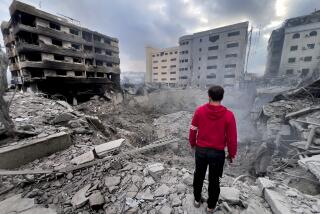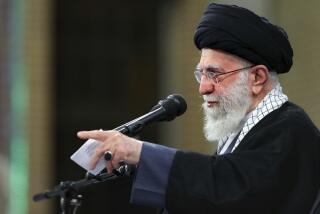Arabs Point Finger at Netanyahu
- Share via
CAIRO — Three days of bloodshed and dozens of Palestinian and Israeli deaths brought Israel condemnation in the Arab world Friday, with even friendlier leaders showing little sympathy for Prime Minister Benjamin Netanyahu, saying he had brought the troubles upon himself.
A sense of “I told you so” emanated from Arab capitals--where commentators said Netanyahu had been arrogant in dismissing repeated warnings that his hard-line policies, particularly on Jerusalem and on strengthening Jewish settlements, were pushing Palestinian emotions to explosive levels.
Some analysts could scarcely hide their glee that the right-wing Netanyahu was speaking with Palestinian Authority President Yasser Arafat and Egyptian President Hosni Mubarak to try to end a political crisis.
Mubarak, who has been seeking to establish Egypt’s leadership among the world’s Arab countries, took the initiative to try to bring Netanyahu and Arafat together in Cairo for a summit to halt the violence and put the Middle East peace process back on track.
According to Egyptian television on Friday night, Mubarak spoke at least three times each to Netanyahu and Arafat during the day, trying to bring the sides together--but had been unable, finally, to arrange the meeting.
Like the leaders of Jordan and Morocco, the two other Arab states most friendly to Israel, Mubarak urged Netanyahu to close the archeological tunnel that the Israelis opened this week near Jerusalem’s Islamic holy sites; the tunnel’s completion Tuesday sparked the latest violence.
Morocco’s King Hassan II labeled the tunnel “an act of provocation” that “flagrantly violates all the international resolutions” on Jerusalem.
In Jordan, the daily Al Dustur newspaper warned that the violence in Palestinian territories could jeopardize the peace treaty reached between Israel and Jordan in 1994. More than half of Jordan’s 4 million people are of Palestinian origin, and public opinion in King Hussein’s kingdom has been highly critical of the peace effort in recent months.
“Surely, Jordan cannot ignore the grave complications that will ensue from such bloody events,” the paper said, labeling Netanyahu’s government “right wing” and “fanatic” and saying it had “scorned Arab sentiment.”
Islamic leaders were also harsh in their condemnations of Israel.
*
The sheik of the 1,000-year-old Al Azhar mosque in Cairo, a leading authority for the Sunni Islam sect worldwide, called on Muslims to oppose what he termed Israel’s assault against Al Aqsa mosque in Jerusalem.
“We must face this aggression by protecting the mosque, even with our lives,” Mohammed Sayed Tantawi said. “If we fail, we shall be punished in this world and beyond.”
Egypt’s Muslim Brotherhood, the oldest Islamic political organization in the region, with branches and offshoots across much of the Arab world, urged a “holy war” against Israel to “recover Arab rights and allow us to live in peace and dignity.”
Netanyahu argued that the tunnel does not affect the Muslim holy places in Jerusalem and that its completion was seized as a pretext by Arafat to launch protests and attacks to pressure Israel in the peace process.
But Arab commentators said the tunnel demonstrated Israel’s intent to impose its will on Jerusalem without regard to Palestinians living there.
Lebanese commentator Abdelwahhab Badrakhan said it was “as if this tunnel was opened under Al Aqsa mosque to serve as the Palestinians’ and Arabs’ grave in their battle to defend Jerusalem.”
Abdelbari Atwan, editor of the Palestinian pan-Arab daily Al Quds al Arabi, praised the children who were hurling stones at Israeli police and soldiers in the occupied territories.
“We know full well that Arab peoples everywhere take heart in the running battles taking place. . . . They feel proud,” he said.
Syria’s official daily Al Baath newspaper, meanwhile, accused Netanyahu of “pushing the region toward war” and called the Palestinians’ violent reaction natural.
The paper warned Israelis that they would be confronted with a new intifada, or uprising, with stronger weapons than were used in the previous Palestinian rebellion, which began in 1987.
More to Read
Sign up for Essential California
The most important California stories and recommendations in your inbox every morning.
You may occasionally receive promotional content from the Los Angeles Times.










